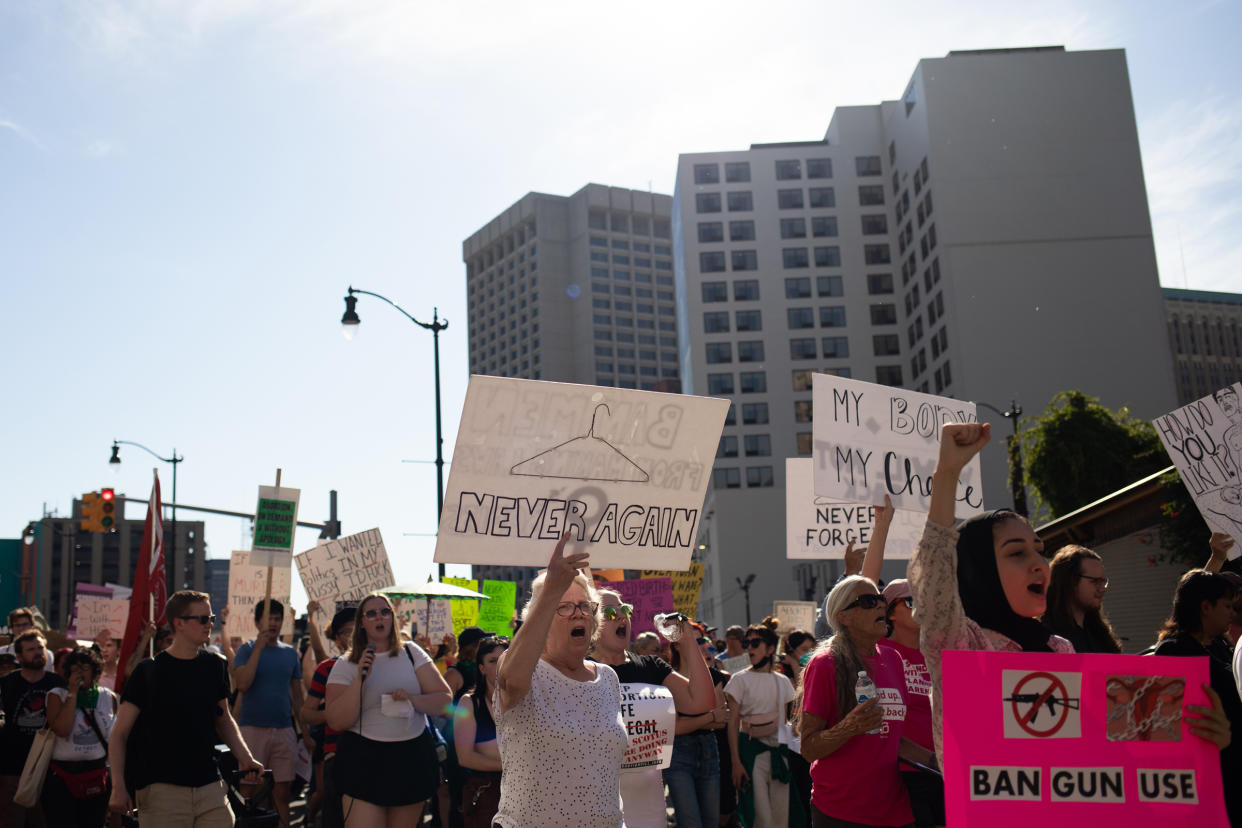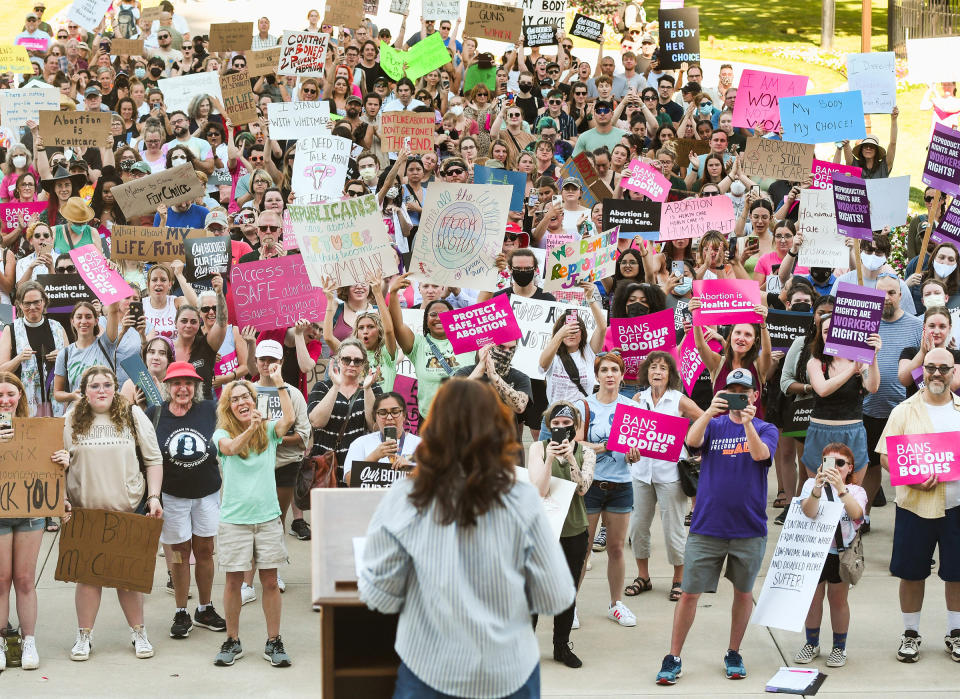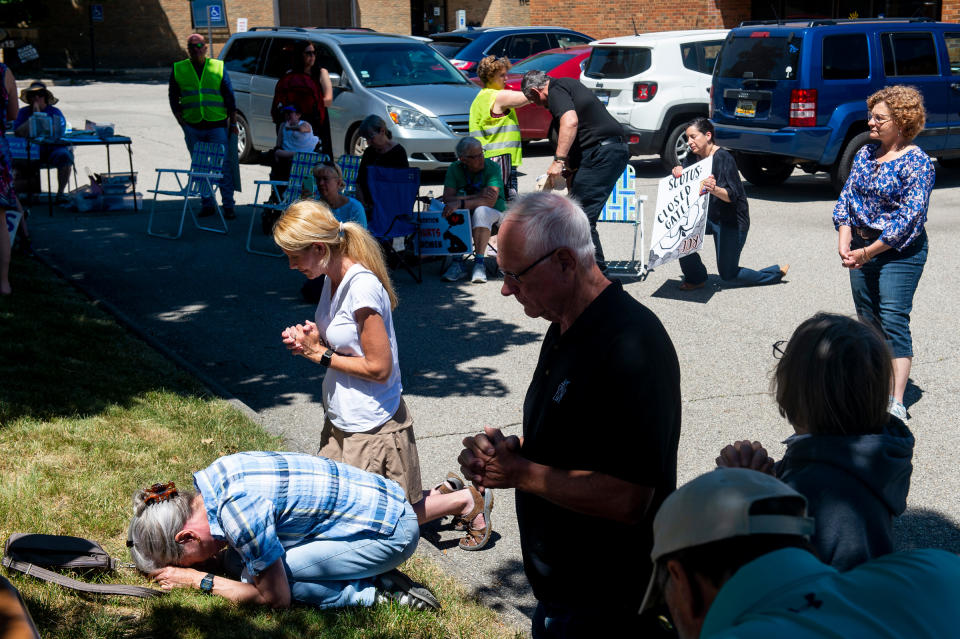Michigan Is Fighting One of the Most Significant Abortion Battles in the Country

Abortion rights demonstrators march through the streets to protest the Supreme Court's decision in the Dobbs v. Jackson Women's Health case on June 24 in Detroit, Mich. Credit - Emily Elconin—Getty Images
Laura Kruger looked skeptical as she opened her door in Wyoming, Mich. on a cold October afternoon. When the canvasser who had knocked asked her how she identified “when it comes to the issue of abortion,” she answered, “pro-life.” But when he asked about Proposal 3, the ballot measure that would enshrine the right to abortion in the state’s constitution, her eyes narrowed and her answer was more nuanced. “Rape, incest, health, are issues that are so important for each individual,” Kruger said. “It’s not a yes or no choice always.”
Kruger is the kind of voter that both anti-abortion advocates and those that support abortion rights in Michigan are hoping to win over this fall in one of the most heated votes on abortion access in the country.
The U.S. Supreme Court’s decision in Dobbs v. Jackson Women’s Health Organization in June turned abortion policies back to the states for the first time in 50 years and made this year’s elections a test of abortion as a motivating issue. Voters around the country are now tasked with deciding on governors, state legislators, and ballot measures that will determine the legality of the procedure where they live. Michigan is at the epicenter of that fight. While five states have ballot measures related to abortion in November, Michigan’s will have the most direct impact by determining whether the state’s 1931 abortion ban can remain on the books.
Michigan’s 1931 law prohibits abortions with no exceptions for rape, incest, or health of the pregnant patient (it only allows abortions that “preserve the life” of a patient). The ballot measure would explicitly establish a right to abortion—as well as contraception, miscarriage management and other decisions about pregnancy—in the state constitution. While the 1931 law is currently blocked by two state courts, the Michigan Supreme Court could lift those injunctions and put it back into effect if the ballot measure fails.
If the amendment passes, Michigan could become the first state to permanently get rid of an abortion ban since the fall of Roe v. Wade. It would also bolster abortion rights advocates’ hopes of using ballot measures to fight for abortion protections in Republican-controlled states. After an unexpected victory for abortion rights in Kansas this summer, a win in Michigan would provide real momentum for activists to put more measures on the ballot in the next few years to add abortion protections into state constitutions.
More from TIME
But if the amendment fails, the future of the state’s abortion policy would depend on the courts in the short term, and on the state legislature after that. Even if the state supreme court does eventually strike down the pre-Roe ban, state lawmakers could pass new restrictions next year that could make abortion extremely difficult to access in the state. A rejection for the amendment would also provide support for anti-abortion advocates’ arguments that the Kansas ballot initiative was an anomaly and signal that their efforts to frame Democrats as extremists who do not want any limits on abortion are working. In the case of Kruger near Grand Rapids, she told canvassers she would vote against the amendment despite her reservations because she wants to stop abortions later in pregnancy.
The fight over the amendment has put abortion center stage in political races at every level in Michigan, from Democratic Gov. Gretchen Whitmer’s and Attorney General Dana Nessel’s reelection campaigns, to state legislators battling for control of both chambers, which are currently controlled by Republicans. But the ballot measure—known as Proposal 3—is where voters will have the most direct say on the issue. While polling in the state showed that 61% of Michiganders supported the measure in late September, both sides are expecting a tense fight. Republicans in the swing state are trying to avoid talking about abortion in favor of issues such as the economy and crime, while Democrats are linking their own races to the future of reproductive freedom in Michigan. Both sides are pouring money into advertising, holding rallies, concerts, and roundtables, and dispatching thousands of volunteers to canvas every corner of the state ahead of the midterm elections on Nov. 8.
The immediate stakes extend beyond Michigan too. After the Supreme Court’s decision, the state became a point of access in the Midwest as states around it, including Wisconsin, Ohio, and Indiana, banned abortion this summer. While Ohio and Indiana’s abortion laws are now blocked by the courts, access there remains precarious and some patients uncertain of their states’ laws are still seeking care in Michigan. Planned Parenthood of Michigan has increased abortion appointments by 30% since the Dobbs decision, with two to three times the number of out-of-state patients from before Roe was overturned. On a recent Tuesday, two patients from Indiana sought abortions in Kalamazoo, Mich. because that was where they could find appointments, and Dr. Sarah Wallett, chief medical officer for Planned Parenthood of Michigan, told TIME she had also recently seen patients from Kentucky, Tennessee, Texas, and Oklahoma.

Read More: ‘Never-Ending Nightmare.’ An Ohio Woman Was Forced to Travel Out of State for an Abortion
Even for those born and raised in Michigan, the debate is affecting the way they see their state. Grace, a 21-year-old from southwest Michigan, had a friend drop her off at the Kalamazoo clinic because she knew her parents wouldn’t support her decision to get an abortion. She works two jobs to pay her college tuition on her own and says she couldn’t afford a child right now. “I’ve always wanted to be a parent,” she says. But her home state’s law is making her reconsider where—and if—she will start a family, and she plans to vote ‘yes’ on the ballot measure. “Wherever I end up, it will be a state that allows abortion,” she says, ”because it’s a form of health care.”
‘Wait a second, which way am I supposed to vote?’
In the final weeks of the campaign, advocates are talking to voters about the ballot initiative at churches, nightclubs, college campuses, barbecues, union halls, and fast food restaurants — and both sides are making their pitch with dark visions of the state’s future.
“Our law makes it a felony to provide an abortion or to assist someone in obtaining an abortion. It’s very dangerous,” says Nicole Wells Stallworth, executive director of Planned Parenthood Advocates of Michigan and one of the leaders of the Reproductive Freedom For All ballot campaign. “A ‘yes’ on three means that we’re going to be restoring the rights that we have had under Roe v. Wade for nearly 50 years,” she adds. “Michigan will decide for Michigan.”
With large donations from groups including the ACLU, Planned Parenthood, NARAL and the Center for Reproductive Rights, the Reproductive Freedom For All campaign raised more than $8 million before the ballot initiative was certified in September, according to campaign finance disclosures. They have been running ads all over the state, often featuring ob-gyns like Dr. Shari Maxwell, who campaigners say are seen as trusted messengers. “Politicians should stay in their lane,” Maxwell says she tells patients and neighbors who ask about the proposal. “Let me do medicine and let me interact with you.”
Volunteers with the campaign say a large part of their job is educating voters on the details of the proposal. Even in Ann Arbor, where many voters are liberal and highly educated, volunteers found multiple voters on a recent canvassing trip who had heard about the measure but weren’t confident that a ‘yes’ vote would support abortion rights or didn’t know what the amendment would actually do. “My daughter who is voting absentee was like, ‘Wait a second, which way am I supposed to vote?’” Chuck Marchand, 54, told canvassers as he stepped out onto his porch covered in brightly colored fall leaves. Volunteers told Marchand and other voters that the amendment would prevent the state’s 1931 law from criminalizing doctors for decisions they made while treating pregnancy complications and “restore Roe” in the state of Michigan.
But opponents of the proposed amendment argue it goes far beyond codifying Roe, and they have been increasing their advertising to get their message out. As of last week, opponents of Proposal 3 had spent $22.7 million compared with $15.9 million from the proposal’s supporters, according to media tracking company AdImpact. Opponents say it would wipe out all restrictions and regulations on abortion in the state—a claim that abortion rights advocates and some legal experts disagree with. Anti-abortion advocates are particularly hoping to convince voters to reject the measure by arguing it would eliminate the state’s current parental consent requirement, which says that providers must obtain written consent from a minor’s parent or legal guardian before performing an abortion, unless a court has granted the minor a waiver. “Even people who are fair minded, middle-of-the-road people are very concerned that this goes too far,” says Christen Pollo, spokesperson for Citizens to Support Michigan Women and Children, the coalition leading the fight against the proposal.
A few days after the Reproductive Freedom for All canvassers sought support in Ann Arbor, volunteers with Students for Life, a national anti-abortion group opposing the amendment, gave out flyers in Wyoming, Mich. The area has trended more liberal in recent elections, and the group found mixed success. Some residents were excited to vote ‘no,’ and Linda Rusticas, a 75-year-old voter, eagerly invited the volunteers inside her home, declaring “this proposal is so radical.” But others closed their doors as soon as they saw an organizer’s sweatshirt emblazoned with “the pro-life generation votes.”

The Catholic Church, which has a large presence in the state, has thrown its weight behind opposing the initiative, raising money, organizing volunteers, and holding prayer rallies and weekly sermons to encourage people to vote no on Proposal 3. The fervor has reached even some who weren’t previously involved in politics, like Father Alex Kratz, a Franciscan friar who is holding weekly “Holy Hours for Life” where hundreds of parishioners gather in a chapel outside Detroit to pray for the measure to fail every Wednesday until the election. He says he hadn’t been focused on abortion before Roe was overturned, but once his state had the power to change its policies, he tuned in. “Michigan, not only in politics, but spiritually is like a swing state. People are watching us,” he says. Even if the proposed amendment—which he describes as “evil to the core”—passes, Kratz claims he’s proof that Dobbs has motivated anti-abortion voters. “We’ll regroup and do even better at getting the moderates on board to not have a total abortion culture in Michigan,” he says.
The other side has also seen new people motivated to vote because of abortion. Jessica Leach, 37, a lifelong Republican in Mount Pleasant, considered herself “pro-life” until the Supreme Court’s Dobbs decision. Leach had her oldest son at 19, and once she started reading about other states’ abortion bans taking effect, she says she felt devastated by people not having the same choice she did, and especially by stories of child rape victims being forced to travel to obtain abortions. “I couldn’t sleep, I couldn’t eat. I mean, it consumed me,” Leach says. Now she, her friend, and their partners—all traditionally Republicans—are voting for the ballot measure and plan to vote for Democrats this year because of abortion.
Testing a strategy
While the issue of abortion touches nearly every race in Michigan, abortion rights advocates say the vote on Proposal 3 is the one that could provide the most durable protections for access in the state.
“As we begin to think about a new world where the right to an abortion at a national level has been struck down by the United States Supreme Court, we have to use every single tool within our democracy to be able to protect our right to abortion,” Wells Stallworth of Planned Parenthood Advocates of Michigan says. “Affirming this right into the [state] constitution means that those decisions would be free from criminal penalty regardless of who’s in office, regardless of who’s a sitting judge, regardless of who the governor is.”
Abortion rights campaigners collected a record number of signatures to put the amendment on the ballot this summer, and there are signs that the issue could again galvanize voters on the side of abortion rights in November. Newly registered voters across the country, and in Michigan, have skewed more Democratic, more female, and younger, since the Supreme Court’s Dobbs decision, according to Democratic data firm TargetSmart.
Ballot measures also often bring in more votes than normal political races, says Kelly Hall, executive director of the Fairness Project, which works to support ballot initiatives and has advised the abortion rights campaigners in Michigan. That happened in Kansas in August. “In swing states and red states alike,” Hall says, “we have to assume that voters are coming to a ballot measure with a different frame of mind than any candidate choice, and keep open minds ourselves about who is on the table for a ballot measure.”
Four other states, including California, Vermont, Kentucky, and Montana, will also have ballot measures on abortion in November. Advocates are still waging court battles over a number of state abortion laws, arguing that state constitutions in places like Florida, Ohio, and Indiana currently protect the right to abortion, and they are also focusing on state supreme court races, which are playing an increasingly important role in determining abortion policy around the country.
Read More: ‘Am I a Felon?’ The Fall of Roe v. Wade Has Permanently Changed the Doctor-Patient Relationship
Michigan’s outcome will have ripple effects for abortion access throughout the region, but it also has implications for future ballot measures. In addition to referencing abortion, the amendment includes protections for contraception and broader reproductive care. “What happens in November will help set the stage for what is possible,” says Chris Melody Fields Figueredo, executive director of the Ballot Initiative Strategy Center. “I think there’s an opportunity to look forward. Roe was the floor, it was never the ceiling of what reproductive justice truly means in the United States.”
But even as Figueredo and others hope to push more ballot measures in the future, they are also worried about a growing backlash to progressive wins at the ballot box that would make this strategy harder to pursue. Conservative state lawmakers have introduced dozens of bills that would restrict or change the ballot initiative process over the last few years. In 2017, the Ballot Initiative Strategy Center tracked 33 such bills, and by 2021, it counted 146 bills, more than a 300% increase. This fall, Arizona and Arkansas both have measures on the ballot that would increase the threshold that future initiatives have to meet. Some anti-abortion advocates like Dan Devine, an attorney who helped organize a prayer rally against the Michigan amendment on Oct. 15, argue the issue would be better handled by the state legislature so that they can “bring the stakeholders together” rather than fighting at the ballot box.
For now, abortion in Michigan is legal, but its future remains uncertain. Voters will have their say in less than three weeks. Proposal 3, says Wallett, the chief medical officer at Planned Parenthood of Michigan, means “making sure Michiganders have futures that they want, that they can control.”

